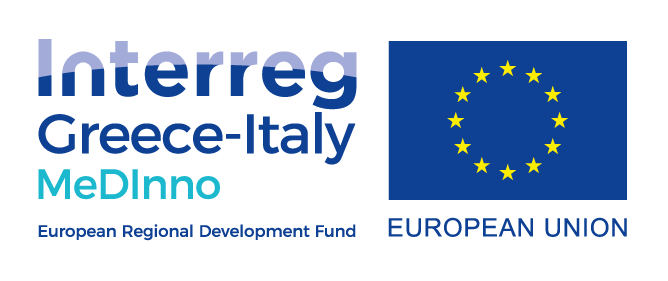Project
Project Background
The agri-food industry is a sector of considerable economic and social significance for both Greece and Italy. It is one of the most regulated and protected sectors in the EU, with significant implications for sustainability such as the fulfilment of human needs, the support of employment and economic growth, and its impact on the natural environment.
Ruminants (sheep, goats and cattle) are important for income generation and security, food supply and for the empowerment of rural livelihoods in the Mediterranean areas especially in mountainous and marginal regions. The geographical, geomorphologic and climatic characteristics of Greece and Italy are particularly favourable to ruminant farming. Although ruminant production is considered as a vital livestock sector its potential is not fully utilised and thus the viability of many farmers is precarious. Mediterranean systems of ruminant production produce a large variety of typical products that could be valorised on local, regional or foreign markets, if they are properly identified and marketed.
Despite the slight decline observed, meat production from traditional ruminant farming still plays an important role in primary production. Although Greece and Italy are the third sheep and goat producing European countries the trade balance in sheep and goat meat (fresh, chilled or frozen) is negative. This demonstrates the need for improvements in this sector.
The sheep and goat sector of Greece and Italy together, produces 53% of the total sheep and 28.1% of total goat’s milk in EU. Various types of cheese can be derived from sheep and especially goat milk, meriting comparative evaluation for their market penetration suitability. Ruminant farming has the potential to expand from its current position, delivering economic, environmental and social benefits. Ruminant breeding represent an alternative in the rural economy and way of alleviating the rural unemployment and poverty.
Correspondingly, adaptations are needed in the ruminant value chains in order to improve the products’ value and to optimise farmers’ income and competitiveness. Such measures include: process and product modifications according to market segmentation requirements, and the improvement of market structures and farmers’ organisations. These are prerequisites for enhancing the capacity of all actors in the value chain to deal with the standards and regulations of local, regional and international markets, as well as improving the farmers’ capacity to appropriate a reasonable share of the added value. A value chain analysis (from the initial production phases to its final market destination) is essential to an understanding of markets, the risks and the added value in each step, the participation and organisation of different actors, and the factors that limit the income and competitiveness of farmers.
The results of such an analysis and the lessons learned from this intervention will be transferable to other regions with similar socio-geographic profiles.
Investment to improve animal husbandry and processing techniques as well as realization of national breeding activities will improve competitiveness of Ruminant production. If this is closely connected to active usage of the advantages of comparative quality it will help to build a recognizable brand on foreign, mainly European markets. In order to increase market share adequate support will be provided to producers and exporters finding and entering new non-traditional markets. Moving away from commodity status into a more specialized marketplace can improve returns. The potential in specialized or niche markets is an opportunity for the ruminant supply chain.
Project Idea
The overall project objective is to support the ruminant farming and agri-food micro & small enterprises through the development of innovative processes and products based in local dairy and meat tradition of the Programme area, contributing to its smart, sustainable and inclusive growth.
The proposed project aims at a high stakeholder involvement. Producers, producer groups, processors, purchasers, exporters, certification agencies and research and development agencies will participate in workshops, focus groups and educational and training seminars.
The development of a joint mechanism between the two countries that will allow exchange and transfer of knowledge will be assisted by a multilevel partnership scheme involving regional authorities (Region of Epirus and Union of Provinces of Puglia), farmers’ organizations (Association of Transhumance Stockbreeders of Epirus, Confederation for Italian Farmers of Bari) and chambers of commerce (Chamber of Commerce of Foggia and Greek-Italian Chamber of Commerce of Thessaloniki/AB) with a wide territorial impact.
Project Scope
Objectives
The project mainly aims to examine the key parameters of ruminant production and marketing and to facilitate the development of an extrovert and innovative meat and cheese sector, through knowledge transfer, standardisation and certification of existing local products, new product development and cluster creation. A possible emphasis on native breeds & utilisation of the Programme area’s rich flora terrain, through grazing serves the purpose of product differentiation as a basis for increased added value for the consumer; new cheese (goat cheese) and meat (heavy lambs) products will serve the same purpose and open up export possibilities.
The project also aims to:
- Map and describe the specific meat and cheese market in order to have a better understanding of customers’ profile.
- Train producers to focus on meat and cheese quality and introduce them to basic and novel cheese making processes. Educate them on required attention to the details of genetic selection, flock health and nutrition, lamb finishing and transporting to market.
- Identify supply channels and marketing arrangements that offer the ruminant industry the greatest market potential – short, medium and long term.
- Utilise the terrains unique environmental characteristics into high value products.
- Strengthen of synergies between the partners.
Expected results
The project is expected to result to the enhancement of ruminant farming and agri-food micro & small enterprises, through the development of new products and the joint promotion of meat and cheese products of the Programme area. It is expected that the whole agri-food market (including processing and marketing) will benefit from the project results though their direct participation in project activities as well as through the valorisation of the project outcomes and results (a minimum number of 20 enterprises of NACE M section will benefit directly or indirectly from the project results).
The project is also expected to result to:
- In depth analysis and understanding of the Europe’s market share and size, general existing and emerging trends in meat and cheese consumption and marketing, product distribution and sales, potential markets, competition, competitive advantage and analysis.
- Development of a general picture of the cheese and meat market, through the implementation of qualitative research (interviews, survey questionnaires, data analysis and interpretation).
- Familiarisation and awareness raising of customers, producers, entrepreneurs, sectorial stakeholders etc. concerning new cheese and meat production and market potential.
- Better understanding of respondents’ attitudes, feelings, beliefs, experiences and reactions regarding the cheese and meat industry.
- New product development and integrated brand development for the new products (label, package, product ID, placement strategy, audiovisual spots).
- Penetration into new markets based in jointly developed roadmaps.
- Achievement of quality standards-support from major retailers through the development of specific standardisation guidelines.
- Enhancement of stakeholders’ potential and opportunities through the development of territorial clustering and networking schemes.



Innovation & Competitiveness
This webpage has been produced with the financial assistance of the European Union. The contents of the webpage are the sole responsibility of the project partners and can in no way be taken to reflect the views of the European Union, the participating countries, the Managing Authority and the Joint Secretariat.
